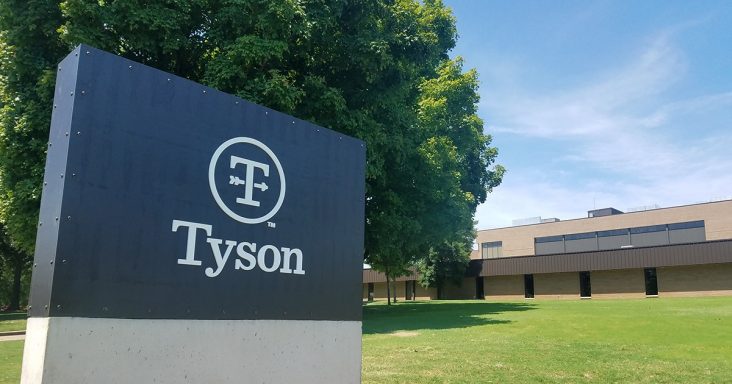Tyson confirms 969 jobs to be lost in Van Buren; company pushes automation, faces lawsuits
by March 14, 2023 11:44 am 5,122 views

The news hit like a freight train Monday (March 13) when Tyson Foods quietly announced the closure of its large chicken processing facility in Van Buren – a facility that has been open since 1975 and expanded over the years.
Springdale-based Tyson Foods sent 969 employees WARN letters saying the last day of operation is slated for May 12. Tyson Foods did not provide details regarding benefits or options for displaced workers. The company only said it’s working with employees to provide opportunities for relocations where applicable within the company.
Details surrounding the closure have been limited, but Tyson Food did confirm that no growers who furnish birds to the Van Buren plant will be impacted. Their bird production may be shifted to facilities Tyson operates in Springdale and Clarksville.
“We are having individual conversations with the contract growers who may be impacted. We value our relationships with our growers and their support in maintaining the highest quality animal welfare practices and biosecurity measures to protect our animals and their contributions to our business,” said Tyson spokesman Derek Burleson.
While the closure news may have seemed puzzling given Tyson Foods’ plan to grow chicken production this year by 15%, new plants in Humboldt, Tenn., and Danville, Va., are expected to pick up the slack for the shuttered Van Buren plant and an older facility in Glen Allen, Va., also to close as of May 12. An estimated 692 jobs will be lost in Glen Allen.
The Danville, Va., plant is expected to be operational by August. Construction began in 2021 on the estimated $300 million Danville facility, and it will be a fully-cooked operation like the plant in Van Buren. The highly automated plant will employ just 400 workers compared to the 969 in Van Buren and 692 in Glen Allen. Tyson Foods also told Talk Business & Politics that increased capacity in other plants would help with the production increase.
Tyson’s move to more automation is nothing new. The company, which has always focused on using more equipment and fewer workers, vowed to further push the boundaries of automation in August 2019 when it opened its manufacturing automation center in downtown Springdale.
The large Humboldt chicken complex and plant opened in April 2021 with a price tag of $425 million. The facility now has about 1,500 workers.
While Tyson is leaving Van Buren, Simmons Foods opted to invest in that community. The Siloam Springs-based chicken company invested $100 million into expanding its plant in Van Buren last year. Simmons added 65,000 square feet of space and 100 more jobs to that plant in addition to more automation. The Simmons plant employs roughly 650 workers that produce fully cooked chicken for food service customers. Simmons has openings for around 50 jobs at its Van Buren plant, according to the company’s website.
THE AUTOMATION PUSH
Tyson’s move to more automation is one way it plans to fix its chicken business which has struggled with the retention of plant workers dating back to the pandemic. The Springdale-based meat giant has plans to commit more than $1.3 billion in automation to its factories over the next three years.
Automation is just one of the tactics Tyson is using to improve efficiency and financial returns in its chicken segment. The segment leadership was also recently changed after a lackluster financial performance. Tyson’s first quarter chicken segment saw operating income decrease 51% to $69 million, down from $140 million in the same quarter last year. Revenue was $4.3 billion, up from $3.9 billion as prices rose 7.1% from a year ago.
Tyson CEO Donnie King said in the February earnings call that the dismal performance of the chicken business was partly the company’s fault. He said softer demand in retail chicken was also to blame. Tyson Foods Chief Financial Officer John R. Tyson has said Tyson plans to grow its domestic chicken production to 42 million head per week during this fiscal year, which would be a 15% production boost. The increase should enable it to improve fixed cost leverage, grow volume and gain market share, according to the CFO.

“We will continue optimizing our plant network and portfolio mix to maximize the profitability of our chicken segment, particularly by growing our portfolio of value-added products, which remain in high demand. I would remind you that we are fully staffed, and we continue to invest in a better workplace experience through automation, etc. We are growing our business, servicing our customers and becoming the most sought-after place to work, and we will compete with the very best in the chicken space,” CFO Tyson said.
EMPLOYEES SUE
While Tyson Foods may continue to be a “sought-after” place to work, 34 of its current and former employees sued the company in a Pulaski County Circuit Court (60CV-23-1647) last week for negligence regarding proper health protocol during the COVID-19 pandemic.
Plaintiffs in the case include employees from the Van Buren plant and facilities in Green Forest, Springdale and Rogers. The suit states that Tyson did not provide masks nor enforce a mask mandate until late April 2020 and did not practice social distancing until May 2020.
“In the face of rampant illness and death, Tyson asked its workers to sacrifice their health and lives to meet 3 production goals,” noted the filing. “Tyson’s decisions to force its employees to work in these conditions caused extreme emotional distress to Tyson workers and their family members.”
Tyson declined to comment on the pending litigation.
Tyson also has a federal civil case pending over wrongful deaths related to the pandemic. A federal appeals court has reinstated a civil case brought by 41 employees and the death of one in its Amarillo, Texas, beef packing plant.
Tyson also recently lost an appeal to the U.S. Supreme Court regarding two worker safety cases that involved four deaths at the company’s Waterloo, Iowa, pork packing plant. Tyson fought to have cases heard in federal court. Tyson argued that an executive order signed by former President Donald Trump in April 2020 gave the company the authority to remain open. The high court decided not to hear the case.
